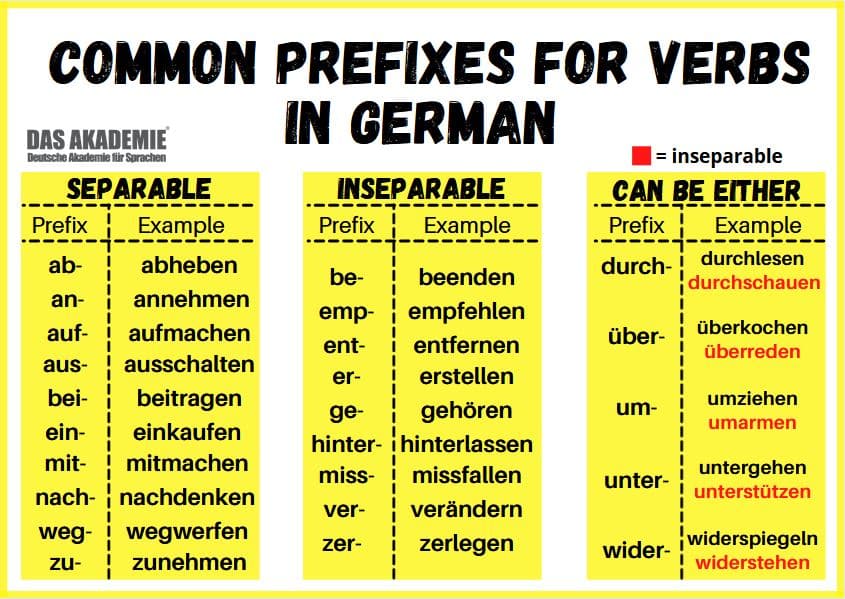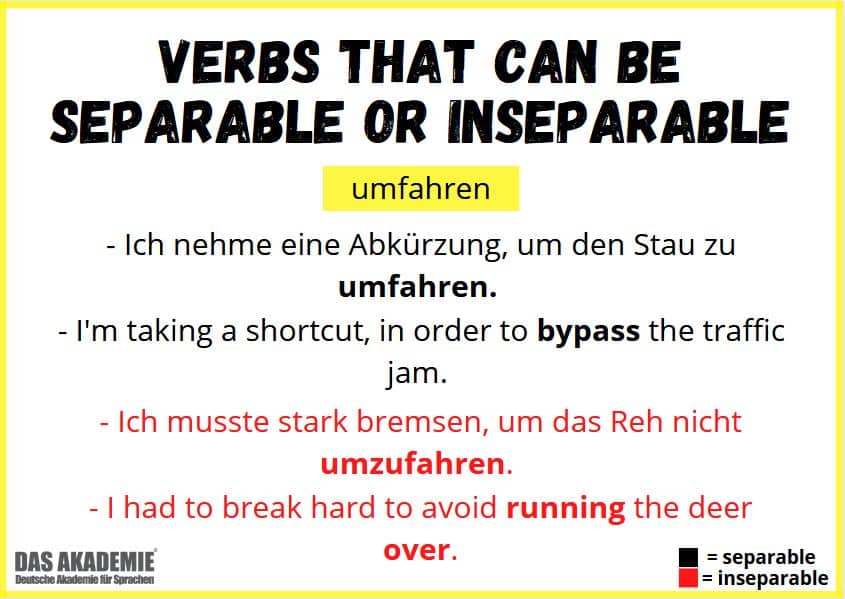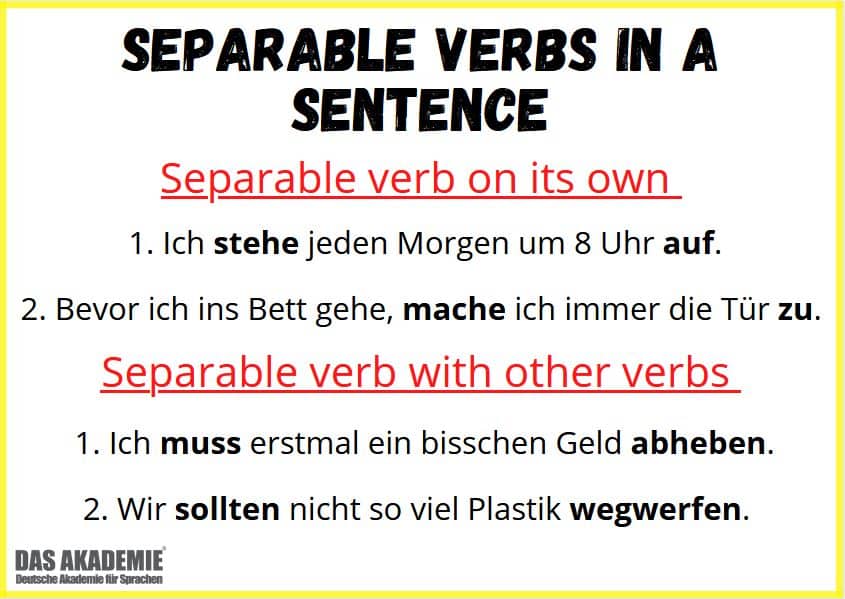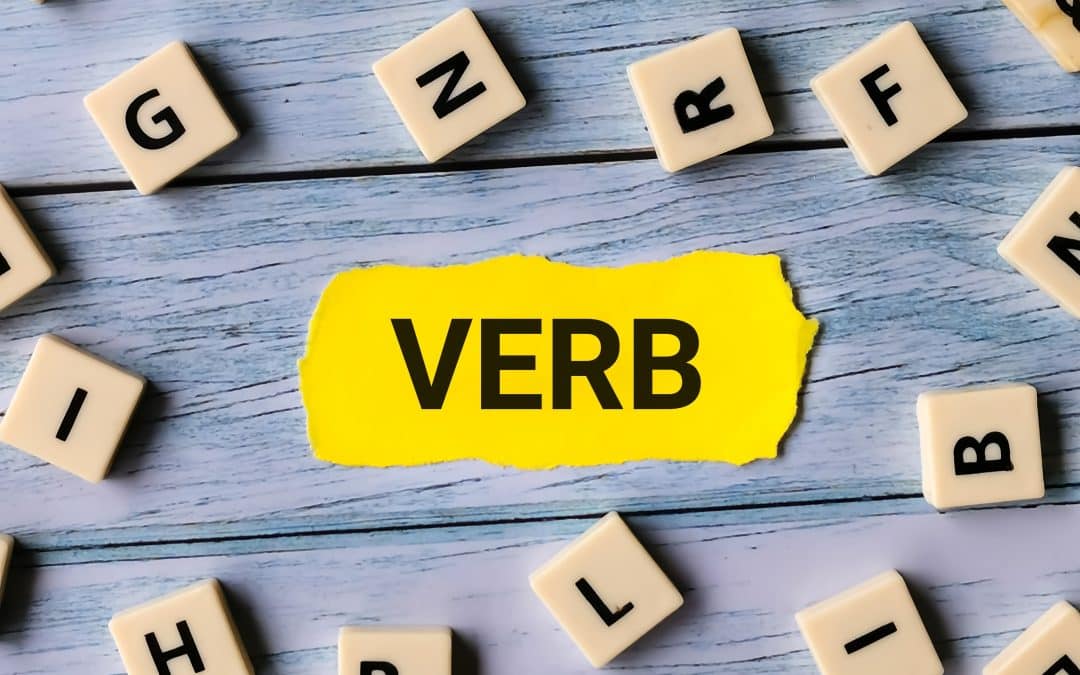Separable and inseparable verbs in German can be one of the simplest, yet hardest grammar topics to master. Separable verbs are verbs whose meaning can be different from the original due to the addition of a prefix. Sometimes, the meaning of a separable verb will only be slightly different to that of the original. There are other instances, however, in which a prefix consisting of as little as 2 letters can completely change the meaning of the verb and the sentence. The easiest way to determine whether or not a verb is separable or inseparable is to simply look at the prefix. Tricky? Not really. There are a number of common ones which are easily recognisable, but you may have to learn a few off by heart as the prefix can either be separable or inseparable:

This table doesn’t contain every single prefix in German – there are simply too many of them! They are, however, the ones you are most likely to encounter!
The key difference between separable and inseparable verbs with the same prefix is that the emphasis (in spoken language) has to be placed on different parts of the word. If the verb is separable, the emphasis is placed on the prefix of the verb. For example, with the verb ‘durchlesen’, the emphasis needs to be placed on ‘durch’, as opposed to ‘lesen’. However, if the verb is inseparable, the emphasis needs to be placed on the verb stem, so in this case, we need to place emphasis on ‘lesen’. This is the case for all of the endings which can be separable or inseparable.
This is not where the difficulties stop, though! There are some instances where you will encounter the exact same verb, but with two different meanings. Sometimes, one of the meanings uses the separable form of the verb, and the other meaning uses the inseparable form! In short, the same verb can either be separable or inseparable, depending on the context of the sentence. In this case, the only real way to get used to them is to learn exactly whether the word can be separated or not, and which meaning takes which form!
For example:

Other examples would be verbs such as durchlaufen, überziehen and untergraben.
How do I use separable and inseparable verbs in a sentence?
- In the case where the verb in question is the only one in the sentence, there is a simple rule to follow: if it is separable, the prefix goes to the end of the sentence.
- If the sentence contains two verbs, one of which is a separable verb (the other would usually be a modal verb), the separable verb will go to the end of the sentence, but unseparated.

For sentences in which a past participle is used, there is also a change we need to make if the verb is separable. As the term suggests, the verb can be separated, but this does not always include making two words out of one verb. Changing the form of the past participle is very simple, we just put the letters -ge (the usual way to form past participles), in between the prefix and the verb stem.

A similar rule applies when we need to include the word ‘zu’ in a sentence. We simply create a gap between the prefix and the verb stem and slide the ‘zu’ in the middle. This can be helpful to know when using ‘um…zu…’ in a sentence.
However, this is German grammar, and never simple! For example, if there are three verbs in a sentence, the separable verb is not likely to be the one at the front. Therefore, two of them (as per usual) will be at the end of the sentence, and we will probably need to use a ‘zu’ in there somewhere. Therefore, even though the verb is separable, we simply put the ‘zu’ in between the two verbs, to make three words at the end of the sentence.
Let’s make it even clearer with an example:

To sum this tricky grammar topic up, the way to master separable and inseparable verbs is mainly through practice. It does start to come naturally if you use the word ‘zu’ and a range of verbs in your daily speech, but practice is always the best solution. If you’re ever unsure, our recommendation would be to say the prefix of the verb on its own. As a rule, if the word sounds like it exists alone in the German language, it is likely to be the prefix of a separable verb, for example ‘ab-‘. If you say the short prefix and it sounds ridiculous, for example ‘be-‘, your best bet would be to keep it together with the verb stem.
If you would like to put this new grammar knowledge into practice and learn how to use it in everyday speech, check out our upcoming courses!

